
Advances in Materials and Processing Technologies
Scope & Guideline
Fostering Innovation in Mechanics of Materials
Introduction
Aims and Scopes
- Material Characterization and Properties:
Research that investigates the mechanical, thermal, and electrical properties of materials, including composites, metals, polymers, and ceramics. - Advanced Manufacturing Processes:
Studies focusing on innovative manufacturing techniques such as additive manufacturing, laser processing, and advanced welding methods, aimed at improving efficiency and material properties. - Sustainable and Green Materials:
Research on eco-friendly materials and processes, including the use of bio-based composites and recycling technologies to minimize environmental impact. - Nanotechnology and Materials Engineering:
Explorations into the applications of nanomaterials and nanocomposites, studying their unique properties and potential uses in various applications. - Computational Modeling and Simulation:
Studies employing computational methods to predict material behavior, optimize processing parameters, and simulate manufacturing processes. - Tribology and Wear Behavior:
Research focused on the friction, wear, and lubrication properties of materials, particularly in the context of engineering applications.
Trending and Emerging
- Additive Manufacturing and 3D Printing:
There is an increasing trend in research dedicated to additive manufacturing technologies, focusing on material optimization, process parameters, and innovative applications in various industries. - Hybrid and Composite Materials:
A growing interest in the development and characterization of hybrid and multi-material systems, which combine different types of reinforcements to enhance mechanical properties and functionality. - Smart Materials and Functional Coatings:
Emerging research on materials that respond to environmental stimuli, including self-healing materials and coatings with specific functionalities, such as antibacterial properties. - Sustainable Manufacturing Practices:
A significant increase in studies focusing on sustainable practices in material processing, including life cycle analysis, eco-friendly materials, and green manufacturing techniques. - Machine Learning and AI in Materials Engineering:
The integration of artificial intelligence and machine learning techniques in materials research for optimizing processes and predicting material behaviors is on the rise.
Declining or Waning
- Traditional Metalworking Techniques:
Research related to conventional machining methods, such as turning and milling, has decreased as interest shifts towards advanced and automated manufacturing techniques. - Basic Material Processing Techniques:
Studies focusing on foundational material processing methods are becoming less prominent as the field advances towards more complex and technologically integrated processes. - Non-Mechanical Properties:
Research that emphasizes purely theoretical or non-mechanical aspects of materials, such as chemical composition without connection to processing or application, is becoming less common.
Similar Journals
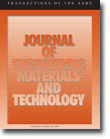
JOURNAL OF ENGINEERING MATERIALS AND TECHNOLOGY-TRANSACTIONS OF THE ASME
Exploring innovative solutions for a sustainable future.JOURNAL OF ENGINEERING MATERIALS AND TECHNOLOGY-TRANSACTIONS OF THE ASME is a premier journal published by the American Society of Mechanical Engineers (ASME), dedicated to advancing the field of engineering materials and technology. With an ISSN of 0094-4289 and E-ISSN 1528-8889, this journal has provided invaluable insights since its inception in 1973. Operating from its headquarters in New York, United States, it serves a global audience of researchers, professionals, and students alike. The journal is recognized for its rigorous peer-review process and its commitment to disseminating high-quality research, currently holding a Q3 quartile ranking across multiple categories including Condensed Matter Physics, Materials Science, Mechanical Engineering, and Mechanics of Materials. With a focus on exploring innovative materials and their applications, it aims to foster collaboration and discovery in the engineering community. Although it is not an open-access journal, it continues to play a vital role in shaping the future of engineering materials research up to 2024. Researchers and practitioners will find in this journal a significant platform to support the development and understanding of engineering materials, making contributions that resonate through academia and industry.

Korean Journal of Metals and Materials
Elevating Knowledge in Metals and Materials ScienceWelcome to the Korean Journal of Metals and Materials, a premier publication dedicated to advancing research in the interdisciplinary fields of metals and materials science. Published by the Korean Institute of Metals and Materials, this journal aims to foster the dissemination of innovative findings and significant developments across various domains, including electronic, optical, and magnetic materials, metals and alloys, as well as modeling, simulation, and surface coatings. With a commendable Q3 quartile ranking in several relevant categories as of 2023, it serves as a vital resource for researchers, professionals, and students interested in the latest scientific trends and technological applications. The journal has successfully converged from 2007 to 2024, showcasing a rich archive of knowledge. Engaging with this publication gives readers the opportunity to stay updated with critical advancements and enhances collaboration within the vibrant materials science community. Access is available through various platforms, ensuring that our content is widely accessible to all those striving for excellence in the field.
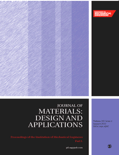
PROCEEDINGS OF THE INSTITUTION OF MECHANICAL ENGINEERS PART L-JOURNAL OF MATERIALS-DESIGN AND APPLICATIONS
Empowering Researchers to Shape the Future of Materials EngineeringPROCEEDINGS OF THE INSTITUTION OF MECHANICAL ENGINEERS PART L-JOURNAL OF MATERIALS-DESIGN AND APPLICATIONS is a prestigious academic journal published by SAGE PUBLICATIONS LTD, focusing on the dynamic fields of mechanical engineering and materials science. With an impressive impact factor reflective of its rigorous scholarly contributions, this journal serves as a vital platform for the dissemination of innovative research and practical applications in materials design and engineering processes. Since its inception in 1999 and continuing through 2024, it has maintained a robust reputation, achieving a Q2 ranking in both Materials Science (miscellaneous) and Mechanical Engineering categories, as well as commendable Scopus ranks that place it in the top percentiles of its fields. Located in the United Kingdom, the journal encourages submissions from researchers and professionals who are seeking to advance their understanding of materials applications while fostering interdisciplinary collaboration. Although it currently operates under traditional access terms, the journal prioritizes impactful research that addresses contemporary challenges in design and manufacturing, ensuring that it remains a must-read for anyone invested in the innovations shaping our technological landscape.

Transactions of the Indian Ceramic Society
Advancing the Science of Ceramics and CompositesTransactions of the Indian Ceramic Society is a distinguished journal published by Taylor & Francis Ltd, focusing on the vital field of ceramics and composites. With an ISSN of 0371-750X and an E-ISSN of 2165-5456, this journal serves as a crucial platform for disseminating cutting-edge research and innovations in ceramic materials science. Operating since 1941, it has established a solid reputation within the academic community, currently holding a Q3 ranking in the Ceramics and Composites category according to the 2023 Scopus rankings. Though not an open-access journal, it provides a wealth of insights and findings that can significantly impact both theoretical and practical applications in materials science. The journal aims to facilitate knowledge exchange among researchers, professionals, and students, thereby pushing the boundaries of what is possible in the world of ceramics. It is a valuable resource for anyone looking to advance their understanding and contribute to this ever-evolving field.
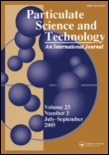
PARTICULATE SCIENCE AND TECHNOLOGY
Advancing the Frontiers of Particulate ResearchParticulate Science and Technology is a distinguished journal published by Taylor & Francis Inc, dedicated to advancing the understanding and application of particulate materials across various scientific fields. Serving the international community since 1983, this journal features original research, reviews, and technical notes that address key developments in chemical engineering, particularly focusing on the generation, processing, and application of particulate matter. With an impact factor that reflects its significant contributions within the discipline (Ranked Q2 in Chemical Engineering), the journal provides a vital platform for researchers, professionals, and students seeking to enhance their knowledge and influence in the field. While not currently open access, Particulate Science and Technology is committed to disseminating high-quality research that stimulates innovation and fosters collaboration amongst experts worldwide. For those invested in the advancement of chemical engineering principles, this journal is an invaluable resource.
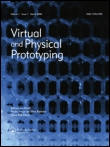
Virtual and Physical Prototyping
Bridging Theory and Practice in PrototypingVirtual and Physical Prototyping is a premier scholarly journal published by Taylor & Francis Ltd, which has established itself as a leading platform for innovative research in the fields of Computer Graphics, Computer-Aided Design, Industrial and Manufacturing Engineering, Modeling and Simulation, and Signal Processing. Since its inception in 2006, the journal has gained significant recognition, currently ranked in the Q1 quartile in multiple categories, reflecting its high impact and rigorous standards of scholarship. Now an Open Access journal as of 2023, it provides a unique opportunity for researchers, professionals, and students to share their work widely and engage with a global audience. With its strategic emphasis on the convergence of virtual and physical prototyping technologies, this journal contributes vital knowledge and insights that drive innovation and development in manufacturing processes and design methodologies. Located in the United Kingdom, its comprehensive approach to both theoretical and practical aspects of prototyping ensures that it remains an essential resource for advancing the respective fields it represents.

Journal of Metals Materials and Minerals
Catalyzing Discoveries in Metals, Ceramics, and BiomaterialsJournal of Metals Materials and Minerals (ISSN: 0857-6149) is a renowned academic publication dedicated to the interdisciplinary fields of metallurgical science, materials engineering, and mineralogy. Published by Chulalongkorn University, Metallurgy & Materials Science Research Institute in Thailand, this journal serves as a pivotal platform for researchers to disseminate their findings and explore innovative applications related to metals, ceramics, polymers, and biomaterials. Although the journal does not currently adopt an open-access model, it provides insightful content that facilitates knowledge sharing among professionals and academics alike. The journal has established its credibility with impressive Scopus ranking percentiles, particularly in categories such as Metals and Alloys and Ceramics and Composites. With an emphasis on advancing the understanding of materials science from 2017 to 2024, the Journal of Metals Materials and Minerals remains an essential resource for those striving to contribute to and stay informed about the latest trends and breakthroughs in these dynamic fields.
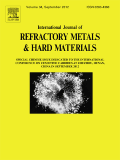
INTERNATIONAL JOURNAL OF REFRACTORY METALS & HARD MATERIALS
Uncovering the potential of refractory materials in technology.INTERNATIONAL JOURNAL OF REFRACTORY METALS & HARD MATERIALS, an esteemed publication by Elsevier Science Ltd, stands at the forefront of materials research, focusing on the development and application of refractory metals and hard materials in various engineering fields. With an impressive impact factor and recognition as a Q1 journal across several categories including Ceramics and Composites, Materials Chemistry, and Mechanical Engineering, it serves as a vital resource for researchers, professionals, and students alike. The journal has been continuously publishing high-quality research since its inception in 1982, with a convergence of developments spanning through to 2024. Its Scopus rankings further emphasize its significance, boasting ranks in the top percentiles of relevant scientific fields. Although it operates under a subscription model, the depth and rigor of the research published within its pages ensures that it remains an invaluable tool for those pursuing innovation and exploration in materials science.

METALLURGICAL AND MATERIALS TRANSACTIONS A-PHYSICAL METALLURGY AND MATERIALS SCIENCE
Pioneering Discoveries in Physical MetallurgyMETALLURGICAL AND MATERIALS TRANSACTIONS A - PHYSICAL METALLURGY AND MATERIALS SCIENCE, published by Springer, is a prestigious journal that plays a pivotal role in advancing the fields of physical metallurgy and materials science. With an ISSN of 1073-5623 and an E-ISSN of 1543-1940, this American journal provides a vital platform for disseminating cutting-edge research and innovative findings relevant to condensed matter physics, mechanics of materials, and metals and alloys. The journal, indexed with an impressive Q1 ranking in multiple categories in 2023, ensures its position among the top-tier publications, making it an essential resource for researchers, professionals, and students alike. Spanning decades of invaluable contributions since its inception in 1975, METALLURGICAL AND MATERIALS TRANSACTIONS A focuses on fostering academic dialogue, promoting collaboration, and showcasing leading-edge discoveries that drive the materials science community forward. Researchers seeking to publish their work in a highly visible forum will find this journal an optimal choice for reaching a discerning audience.
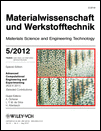
MATERIALWISSENSCHAFT UND WERKSTOFFTECHNIK
Empowering Engineers Through Material Insights.MATERIALWISSENSCHAFT UND WERKSTOFFTECHNIK, published by WILEY-V C H VERLAG GMBH, is a prominent journal dedicated to the field of materials science and engineering. With its ISSN 0933-5137 and E-ISSN 1521-4052, this journal serves as a vital resource for researchers and professionals engaged in exploring the intricate relationships between the properties of materials and their applications. Established in 1970 and continuing through 2024, the journal has been consistently recognized in various categories, achieving a Q3 ranking in 2023 across Condensed Matter Physics, Materials Science (miscellaneous), Mechanical Engineering, and Mechanics of Materials. Although it does not offer open access, its high-quality peer-reviewed content is fundamental to the advancement of knowledge within its three key areas: novel material development, material characterization, and application of materials in engineering contexts. As a driving force in the scientific community, MATERIALWISSENSCHAFT UND WERKSTOFFTECHNIK continues to cater to the curiosity of aspiring students, seasoned professionals, and researchers alike, facilitating a deeper understanding of the complexities of material technology.